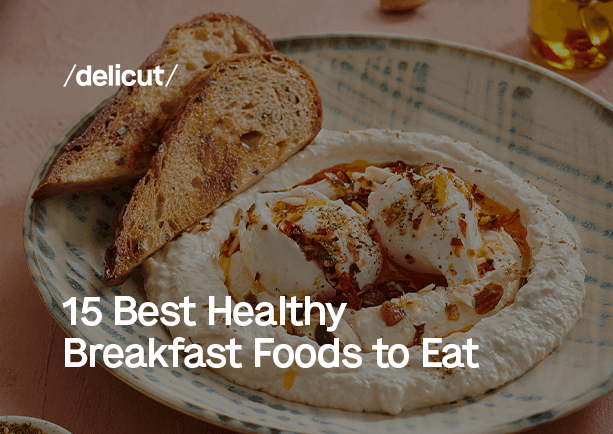15 Best Healthy Breakfast Foods to Eat

We all know that breakfast is the most important meal, and with these nutrient-packed options, you can fuel your body and mind for a productive and energized morning. From fiber-rich whole grains to protein-packed eggs and antioxidant-rich fruits to wholesome dairy alternatives, we have curated a list of breakfast foods that taste amazing and provide a wide range of essential nutrients.
So, whether you're looking for quick and convenient options or prefer to savor a leisurely morning meal, join us as we explore the top 15 breakfast foods that will kickstart your day on a healthy and satisfying note.
What is a Healthy Breakfast?
A healthy breakfast is a balanced meal with essential nutrients, energy, and sustenance to kickstart your day. It typically includes a combination of whole grains, lean proteins, healthy fats, and a variety of fruits or vegetables. A healthy breakfast should be rich in fiber, vitamins, minerals, and antioxidants while being moderate in added sugars and unhealthy fats.
15 Best Healthy Breakfast Foods to Kickstart Your Day
Breakfast is the foundation of a healthy lifestyle, and with these nutrient-rich options, you can fuel your body and mind for a productive and energized morning. Whether you prefer a quick and easy meal or enjoy a leisurely breakfast, these top 15 breakfast foods will help you create a wholesome and delicious start to your day.
Let's explore these breakfast powerhouses that will nourish and energize you from the very first bite!
1. Oatmeal
Oatmeal is a versatile and nutritious breakfast option made from ground oats. It is an excellent source of complex carbohydrates, dietary fiber, vitamins, and minerals. Oats contain a specific type of fiber called beta-glucan, which has been shown to have numerous health benefits, including helping to lower cholesterol levels and promoting heart health.
You can prepare it in different ways, such as stovetop cooking, overnight oats, or microwave preparation. You can also customize your oatmeal by adding a variety of toppings and mix-ins to enhance its flavor and nutritional value. Popular toppings include fresh or dried fruits, nuts, seeds, honey, cinnamon, and nut butter.
2. Greek Yogurt
Greek yogurt is packed with nutrients, including calcium, vitamin B12, probiotics, and iodine. One of the key advantages of Greek yogurt is its protein content. Compared to regular yogurt, it typically contains almost double the amount of protein, making it an excellent choice for those seeking to increase their protein intake.
Protein is crucial for various bodily functions, including muscle repair and growth, satiety, and supporting a healthy immune system.
Greek yogurt can be enjoyed on its own, used as a base for smoothies, mixed with fruits and nuts, or added to savory dishes as a creamy ingredient. It offers a versatile and nutritious option for breakfast, snacks, or even as a substitute for sour cream or mayonnaise in recipes.
Greek yogurt is also lower in carbohydrates and sugars than other yogurt varieties, which can benefit those following a low-carb or low-sugar diet.
3. Eggs
Eggs are a nutritious and versatile food packed with protein, vitamins, minerals, and healthy fats. They contain all essential amino acids and offer nutrients like vitamin B12, vitamin D, selenium, and choline. Contrary to previous beliefs, eggs do not significantly impact cholesterol levels for most people.
Eggs can be prepared in numerous ways, such as scrambled, boiled, poached, or in omelets. They can be enjoyed on their own or incorporated into various recipes, adding texture, flavor, and nutritional value. Pairing eggs with vegetables, whole grains, or lean proteins can create a balanced and satisfying meal.
4. Berries
Strawberries, blueberries, raspberries, and blackberries, each offering their own unique flavor and nutrient profile. Berries are rich in antioxidants, including anthocyanins, which give them their bright colors and help protect against oxidative stress and inflammation. Berries are a good source of vitamins, minerals, and dietary fiber.
They are particularly known for their high vitamin C content, which supports immune function and collagen production. Berries also provide potassium, folate, and other vitamins and minerals contributing to overall health.
Including berries in your diet is simple and enjoyable. They can be eaten fresh, added to smoothies, tossed into salads, or used as a topping for yogurt, oatmeal, or desserts. Freezing berries in season allows you to enjoy their goodness throughout the year.
5. Avocado
Avocados are packed with healthy monounsaturated fats, which are beneficial for heart health and help promote satiety. Avocados also contain fiber, vitamins, minerals, and antioxidants that support overall well-being. In addition to healthy fats, avocados offer dietary fiber, which supports digestion, helps regulate blood sugar levels, and aids in maintaining a healthy weight.
Avocados are incredibly versatile and can be enjoyed in various ways. They can be mashed and spread on toast, sliced into salads, blended into smoothies, or used as a creamy base for dips and dressings. While avocados are a nutritious addition to a well-balanced diet, consuming them in moderation is important due to their relatively high-calorie content.
6. Whole Grain Toast
Whole grain toast is a wholesome and nutritious breakfast option or a base for a variety of tasty toppings. It offers more nutrients and dietary fiber than refined white bread, made from whole grains like wheat, oats, or rye. It provides complex carbohydrates, which are a great source of sustained energy.
It also contains dietary fiber, which promotes digestive health, helps maintain blood sugar levels, and supports feelings of fullness.
You can spread nut butter for a dose of healthy fats and protein, add sliced avocado for monounsaturated fats and vitamins, or top it with fresh fruits for added vitamins, minerals, and natural sweetness. You can also enjoy it as a side with eggs, lean proteins, or salads to create a balanced meal. When choosing whole grain toast, it's important to read labels and look for bread that states "100% whole grain" or "whole wheat" to ensure you get the maximum nutritional benefits.
7. Chia Seeds
Chia seeds have a high content of fiber. They are an excellent source of soluble and insoluble fiber, supporting digestive health, promoting regular bowel movements, and helping with satiety and weight management. Chia seeds contain omega-3 fatty acids, particularly alpha-linolenic acid (ALA).
They provide a good amount of plant-based protein, making them suitable for a vegetarian or vegan diet.
To incorporate chia seeds into your diet, sprinkle them on top of yogurt, oatmeal, or salads, or add them to baked goods, smoothies, and homemade energy bars. Due to their versatility and mild taste, chia seeds can easily be incorporated into various recipes.
It's important to note that chia seeds expand when in contact with liquid, so it's essential to drink enough water or fluids when consuming them to prevent any discomfort or digestive issues.
8. Almonds
Almonds are rich in healthy monounsaturated fats, fiber, protein, vitamins, and minerals. The monounsaturated fats in almonds have been linked to improved heart health by helping to lower LDL (bad) cholesterol levels. Almonds are an excellent source of energy and dietary fiber, which aids in digestion, promotes feelings of fullness, and supports bowel regularity. It also helps regulate blood sugar levels, making it a suitable choice for individuals managing diabetes or seeking to maintain stable energy levels.
Incorporating almonds into your diet is simple and versatile. They can be enjoyed as a convenient on-the-go snack, sprinkled over salads or oatmeal, blended into smoothies, or used as a crunchy protein coating. Opt for raw or dry-roasted almonds to minimize added oils and sodium.
9. Spinach
Spinach is an excellent source of vitamins K, A, C, folate, and iron. Vitamin K is vital for bone health and blood clotting, while vitamin A supports eye health and a robust immune system. Vitamin C acts as an antioxidant and helps with collagen synthesis, while iron is crucial for oxygen transport within the body.
Spinach is rich in dietary fiber, which aids in digestion, helps regulate blood sugar levels, and supports a healthy gut microbiome.
It can be enjoyed raw in salads, sautéed as a side dish, blended into smoothies, or added to soups, stews, and omelets for an extra nutritional boost. While spinach offers numerous benefits, it is important to note that it contains oxalates, which may interfere with mineral absorption in some individuals, particularly those with kidney issues or certain medical conditions. Cooking spinach or pairing it with foods high in vitamin C can help mitigate this concern.
10. Flaxseeds
Omega-3 fatty acids found in flaxseeds, particularly alpha-linolenic acid (ALA), are beneficial for heart health, brain function, and reducing inflammation. They are high in dietary fiber, both soluble and insoluble. Soluble fiber can help lower cholesterol levels and regulate blood sugar levels, while insoluble fiber supports healthy digestion and prevents constipation.
When consuming flaxseeds, it's best to consume them ground rather than whole to ensure proper digestion and absorption of their nutrients. Flaxseeds can be incorporated into various dishes, such as smoothies, yogurt, oatmeal, baked goods, and homemade granola bars. They add a nutty flavor and a pleasant crunch to recipes.
11. Quinoa
Quinoa is considered a pseudo-cereal, meaning it is technically a seed but used as a grain in cooking. It is gluten-free and offers a range of health benefits. It contains all nine essential amino acids, making it an excellent plant-based protein source for vegetarians and vegans.
It is rich in dietary fiber, which aids in digestion, promotes feelings of fullness, and helps regulate blood sugar levels. It is a good source of various essential minerals, including magnesium, manganese, phosphorus, and iron.
Quinoa is naturally gluten-free and can be easily incorporated into a gluten-free diet. It has a mild, nutty flavor and a versatile texture that works well in various dishes. It can be used as a base for salads, added to soups and stews, used in stir-fries, or enjoyed as a side dish instead of rice or pasta.
12. Cottage Cheese
Cottage cheese is an excellent source of casein protein, which is a slow-digesting protein that provides a steady release of amino acids to support muscle repair and growth. This makes cottage cheese popular among athletes, fitness enthusiasts, and individuals looking to increase their protein intake. It is relatively low in fat and carbohydrates, making it suitable for those watching their calorie intake or following a low-carb diet.
It can be eaten on its own as a snack or paired with fruits, vegetables, or whole-grain crackers.
It can also be used as a versatile ingredient in recipes like salads, dips, smoothies, and even baked goods. Choosing varieties with minimal added sugars and lower sodium content is recommended. Organic or grass-fed options can provide higher nutrient levels and fewer additives.
13. Whole Grain Cereal
Whole grain cereal is made from whole grains, such as oats, wheat, barley, or a combination of grains. Unlike refined cereals, whole grain cereals retain the entire grain, including the bran, germ, and endosperm, which contain valuable nutrients.
It has a high fiber content and is rich in vitamins and minerals, including B vitamins, iron, magnesium, and zinc. Consuming whole grain cereals as part of a balanced breakfast can contribute to sustained energy levels throughout the day.
When selecting whole grain cereal, read the ingredient list and choose options that list whole grains as the first ingredient. Look for cereals with minimal added sugars, and avoid those with artificial flavors or preservatives. Add fresh fruits, nuts, or seeds for extra fiber, vitamins, and healthy fats. Pairing it with low-fat milk or yogurt can also increase the protein content of your breakfast.
14. Green Smoothies
Including leafy greens, such as spinach, kale, or Swiss chard, in green smoothies provides a powerhouse of vitamins, minerals, and antioxidants. These greens are rich in vitamins A, C, K, and folate and minerals like iron, magnesium, and potassium. Fruits like bananas, berries, or mangoes are commonly added to green smoothies for natural sweetness and added nutrients.
Green smoothies can be customized to suit your taste preferences and dietary needs. You can experiment with different combinations of greens and fruits to create a variety of flavors and nutrient profiles.
Adding a tablespoon of healthy fats like almond butter, avocado, or flaxseed oil can further enhance your green smoothie's nutritional value and satiety. A liquid base like water, coconut water, almond milk, or yogurt helps create a smooth consistency and provides additional hydration and nutrients.
15. Sweet Potatoes
Sweet potatoes are packed with essential vitamins, minerals, fiber, and antioxidants. One of the sweet potatoes' notable qualities is their high beta-carotene content, a precursor to vitamin A. They are also a good source of dietary fiber, which aids in digestion, promotes feelings of fullness, and helps regulate blood sugar levels.
The fiber content, combined with the complex carbohydrates in sweet potatoes, provides sustained energy and can contribute to a balanced diet.
The versatility of sweet potatoes makes them a great addition to a variety of dishes. They can be baked, boiled, steamed, or roasted and used in both sweet and savory recipes. From fries and casseroles to soups and desserts, sweet potatoes offer endless possibilities for culinary creativity.
Conclusion
Starting your day with a nutritious breakfast sets the tone for a healthy and energized lifestyle. Incorporating these wholesome choices into your breakfast routine can fuel your day, enhance energy levels, and promote long-term health. Remember, breakfast is not just a meal; it's an opportunity to invest in yourself and prioritize your health from the start of each day. So, rise and shine with a nourishing breakfast, and let these healthy foods empower you to seize the day with vitality and wellness.
FAQs
1. What makes these breakfast foods the best choices for a healthy start to the day?
These breakfast foods are considered the best choices for a healthy start to the day because they are nutrient-dense, provide a good balance of macronutrients (protein, carbohydrates, and healthy fats), offer essential vitamins and minerals, are high in fiber, and contain antioxidants. They support overall health, provide sustained energy, promote satiety, aid in digestion, and contribute to various aspects of well-being, including heart health, brain function, immune support, and weight management.
2. Can these breakfast foods help with weight management or weight loss goals?
Yes, these breakfast foods can benefit weight management or weight loss goals. They are typically nutrient-dense and offer a good balance of protein, fiber, and healthy fats, which can help promote fullness and satisfaction, reducing the likelihood of overeating later in the day. High-fiber foods like whole grains, fruits, and vegetables can also support healthy digestion and regulate blood sugar levels, helping to control appetite and prevent energy crashes.
3. Are these breakfast foods suitable for individuals with dietary restrictions or allergies?
Many of these breakfast foods can be suitable for individuals with dietary restrictions or allergies, but it depends on the specific restrictions or allergies. However, it's important for individuals with dietary restrictions or allergies to carefully read labels and choose products that are specifically labeled as suitable for their needs. Additionally, consulting with a healthcare professional or registered dietitian can provide personalized guidance on selecting breakfast foods that align with specific dietary requirements or allergies.
4. Can these breakfast foods be prepared in different ways to keep breakfast interesting?
Absolutely! These breakfast foods offer a wide range of possibilities for preparation, allowing you to keep your breakfast interesting and varied. By experimenting with different cooking methods, flavor combinations, and presentation styles, you can create exciting and enjoyable breakfast options while reaping these foods' nutritional benefits.
5. Can these breakfast foods be enjoyed by children and picky eaters?
Yes, children and even picky eaters can enjoy many of these breakfast foods. It's all about finding creative and appealing ways to present the food. By involving children in the preparation process and offering various options, you can encourage their participation and help them develop a positive relationship with these healthy breakfast foods.
Read More :
What is Meal Planning? Know the Benefits
Full Course Meals Exploring your Food Palate
The Power of Mindful Eating How to Develop a Healthy Relationship with Food
What are the Benefits of Subscribing to a Meal Plan Delivery Service
Related Blogs
The Burnout Diet
Jan 30, 2026 | 8The mental load of “What should I eat today?"
Jan 22, 2026 | 8The real glow-up starts with your gut health
Jan 14, 2026 | 8Healthy food that doesn’t taste like “Diet Food”
Jan 17, 2026 | 8Why do most people in the UAE get their calories wrong
Dec 8, 2025 | 6DASH Diet Meal Plan
Nov 11, 2025 | 8Fatty Liver Meal Plan
Oct 31, 2025 | 8Pregnancy Diet Meal Plan
Oct 27, 2025 | 82000 Calorie Meal Plan
Oct 1, 2025 | 8Intermittent Fasting Diet Plan
Sep 5, 2025 | 8






